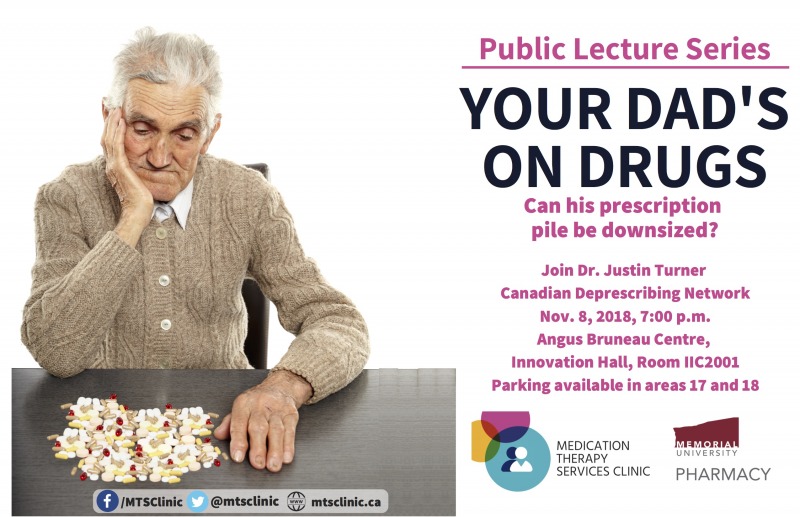Public Lecture Series launches, Nov. 8

“Drugs, drugs, drugs. Which are good, which are bad?” The lyrics from the 1980s Health Canada television jingle warned children that not all medications make you better. Thirty-plus years later, the kids in that commercial may be asking their parents the same question.
On Nov. 8, the School of Pharmacy’s Medication Therapy Services (MTS) Clinic will welcome Dr. Justin Turner of the University of Montreal and the Canadian Deprescribing Network as the inaugural speaker in their Public Lecture Series.
Dr. Turner, who specializes in research around optimizing the safe and effective use of medications in people over 65-years-old, will present, Your Dad’s on Drugs: Can his prescription pile be downsized?
Deprescribing: not a new idea
The term deprescribing, he explained, has only recently begun to gain a more mainstream understanding. Philosophically speaking, however, it has actually been around since the Hippocratic Oath.
“In my thesis I quoted Hippocrates as kind of the godfather of deprescribing, because he basically said if it’s not working, stop taking it,” he said. “The reality is that any one person’s life can have two totally different outcomes based on whether they continue or discontinue a medication or combination of medications.”
The key, he added, is how to notice when a person’s medications are useful and not useful, and determine whether to stop taking them when they’re no longer effective, before they experience potentially-fatal side effects.
The prescribing cascade
Pharmacists describe the prescribing cascade as using medications to treat side effects of other medications. Typical in older patients, Newfoundland and Labrador has a particular familiarity with these types of scenarios:
A daughter notices the large pile of pills that her dad takes each day, and asks him what they’re all for. He explains that some were started to treat the side effects of other medications. His “stomach pill,” as he describes it, was prescribed a couple of years ago to protect his stomach from the anti-inflammatories he took for his arthritis, which his daughter asks if he’s still taking. Dad then reveals that he stopped taking the anti-inflammatories because they no longer worked, and the realization then hits him that he shouldn’t need the stomach pills any longer either. A pharmacist consultation could confirm that he can safely eliminate that medication from his regime, thus simplifying his life.
A widely-acknowledged medication that is not only often unnecessary, but also potentially dangerous and highly addictive, is sleeping pills.
Meet Annie: sleeping pill aficionado
Annie is in her 50s and holds a high stress job. To stay sharp and maximize her performance at work, she kick-starts her day with a coffee plus coffee plus more coffee cocktail. By bedtime her mind still races, but she has to sleep to stay sharp. So what does she do? She takes prescription sleeping pills (such as Zopiclone) and over-the-counter medications such as Benadryl. The next morning, she’s extra-groggy from her bedtime brew, and so her dangerous cycle continues.
It is quite likely that if Annie continues her upper-downer mixology, the risks include delayed reflexes, which could impair her driving and cause car crashes, deteriorate her memory, and increase her risk of falling which could land her in the hospital with a hip fracture.
Driving under the influence of sleeping pills is as risky as driving under the influence of alcohol, Dr. Turner said. “None of which would help Annie’s work performance very much. With the help of a pharmacist, she could learn more about her medications and realize there are other things she could do to help with her sleeping, such as practicing proper sleep hygiene.”
The event takes place on Nov. 8 at 7:00 p.m., at the Angus Bruneau Centre, Innovation Hall. Parking is available in areas 17 and 18. The MTS Clinic is now accepting referrals. To find out more, visit www.mtsclinic.ca